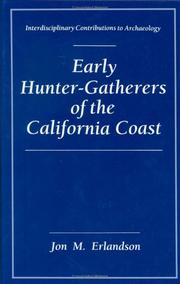| Listing 1 - 4 of 4 |
Sort by
|

ISBN: 0306444216 Year: 1994 Publisher: New York, NY : Plenum Press,
Abstract | Keywords | Export | Availability | Bookmark
 Loading...
Loading...Choose an application
- Reference Manager
- EndNote
- RefWorks (Direct export to RefWorks)
Book
ISBN: 9780520253438 9786612359354 0520934296 1282359355 9780520934290 0520253434 9781282359352 Year: 2008 Publisher: Berkeley : University of California Press,
Abstract | Keywords | Export | Availability | Bookmark
 Loading...
Loading...Choose an application
- Reference Manager
- EndNote
- RefWorks (Direct export to RefWorks)
Archaeological data now show that relatively intense human adaptations to coastal environments developed much earlier than once believed-more than 125,000 years ago. With our oceans and marine fisheries currently in a state of crisis, coastal archaeological sites contain a wealth of data that can shed light on the history of human exploitation of marine ecosystems. In eleven case studies from the Americas, Pacific Islands, North Sea, Caribbean, Europe, and Africa, leading researchers working in coastal areas around the world cover diverse marine ecosystems, reaching into deep history to discover how humans interacted with and impacted these aquatic environments and shedding new light on our understanding of contemporary environmental problems.
Marine mammal remains (Archaeology) --- Marine mammals --- Nature --- Fishing, Prehistoric. --- Prehistoric peoples. --- Underwater archaeology --- Coastal archaeology --- Effect of human beings on. --- Marine mammals in archaeology --- Archaeology --- Mammal remains (Archaeology) --- Aquatic mammals --- Marine animals --- Anthropogenic effects on nature --- Ecological footprint --- Human beings --- Anthropogenic soils --- Human ecology --- Prehistoric fishing --- Cavemen (Prehistoric peoples) --- Early man --- Man, Prehistoric --- Prehistoric archaeology --- Prehistoric human beings --- Prehistoric humans --- Prehistory --- Antiquities, Prehistoric --- Archaeology, Submarine --- Marine archaeology --- Maritime archaeology --- Nautical archaeology --- Submarine archaeology --- Underwater exploration --- Marine archaeologists --- Coastal sites (Archaeology) --- Coasts --- Methodology --- Antiquities --- Primitive societies --- aquatic environments. --- archaeologist. --- archaeology. --- caribbean. --- case studies. --- climate change. --- coastal archaeology. --- coastal environment. --- conservationism. --- conservationists. --- contemporary environmental problems. --- human adaptation. --- human exploitation. --- marine biologist. --- marine biology. --- marine fisheries. --- north sea. --- polar ice caps.
Book
ISBN: 0813053935 0813057000 9780813057002 9780813056166 0813056160 Year: 2019 Publisher: Gainesville : University Press of Florida,
Abstract | Keywords | Export | Availability | Bookmark
 Loading...
Loading...Choose an application
- Reference Manager
- EndNote
- RefWorks (Direct export to RefWorks)
'An Archaeology of Abundance' focuses on the archaeology and historical ecology of a series of islands located off the Pacific Coast of Alta and Baja California, from the Channel Islands to Cedros Island. Compared to the adjacent mainland, these islands have long been considered marginal habitats for ancient hunter-gatherers, beginning with accounts of early Spanish explorers and by later naturalists, scientists, and government agents, as well as the anthropologists and archaeologists who followed.
Islands --- Indians of North America --- Human ecology --- Excavations (Archaeology) --- Antiquities. --- History. --- Channel Islands (Calif.)

ISBN: 0306451778 9780306451775 1461284473 1461311454 Year: 1996 Publisher: New York, NY : Plenum Press,
Abstract | Keywords | Export | Availability | Bookmark
 Loading...
Loading...Choose an application
- Reference Manager
- EndNote
- RefWorks (Direct export to RefWorks)
Prehistoric peoples. --- Human beings --- Agriculture --- Paleoecology --- Glacial epoch. --- Homme préhistorique --- Homme --- Paléoécologie --- Epoque glaciaire --- Effect of climate on. --- Origin. --- Influence du climat --- Origines --- Holocene. --- Pleistocene. --- Homme préhistorique --- Paléoécologie --- Glacial epoch --- Prehistoric peoples --- Ice Age --- Geology, Stratigraphic --- Origin of agriculture --- Agriculture, Prehistoric --- Domestication --- Cavemen (Prehistoric peoples) --- Early man --- Man, Prehistoric --- Prehistoric archaeology --- Prehistoric human beings --- Prehistoric humans --- Prehistory --- Antiquities, Prehistoric --- Pleistocene Epoch --- Holocene Epoch --- Late Quaternary Period --- Postglacial Epoch --- Recent Epoch --- Climatology --- Acclimatization --- Medical climatology --- Origin --- Effect of climate on --- Holocene --- Pleistocene --- History --- Climatic factors --- Primitive societies
| Listing 1 - 4 of 4 |
Sort by
|

 Search
Search Feedback
Feedback About UniCat
About UniCat  Help
Help News
News